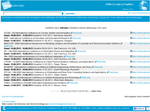Keynote: “Brain Inspired Computing: The Extraordinary Voyages in Known and Unknown Worlds”
Hai (Helen) Li (Duke University, US / TUM – Institute for Advanced Studies, D)
Kurzfassung
Human brain is the most sophisticated organ that nature ever builds. Building a machine that can function like a human brain, indubitably, is the ultimate dream of a computer architect. Although we have not yet fully understood the working mechanism of human brains, the part that we have learned in past seventy years already guided us to many remarkable successes in computing applications, e.g., artificial neural network and machine learning. The recently emerged research on “neuromorphic computing”, which stands for hardware acceleration of brain-inspired computing, has become one of the most active areas in computer engineering. Inspired by the working mechanism of human brain, neuromorphic system naturally possesses a massively parallel architecture with closely coupled memory, offering a great opportunity to break the "memory wall" in von Neumann architecture. The talk will start with a background introduction of neuromorphic computing, followed by examples of hardware acceleration schemes of learning and neural network algorithms and memristor-based computing engine. I will also share our prospects on the future technology challenges and advances of neuromorphic computing.
Curriculum Vitae
 Hai “Helen” Li is Clare Boothe Luce Associate Professor with the Department of Electrical and Computer Engineering at Duke University. She has authored or co-authored over 200 technical papers published in peer-reviewed journals and conferences and holds 70+ granted U.S. patents. She authored a book entitled Nonvolatile Memory Design: Magnetic, Resistive, and Phase Changing (CRC Press, 2011). Her current research interests include memory design and architecture, neuromorphic architecture for brain-inspired computing systems, and architecture/circuit/device cross-layer optimization for low power and high performance. She received the NSF CAREER Award (2012), the DARPA Young Faculty Award (2013), TUM-IAS Hans Fisher Fellowship from Germany (2017), seven best paper awards and another seven best paper nominations. Dr. Li is a senior member of IEEE and a distinguished member of ACM.
Hai “Helen” Li is Clare Boothe Luce Associate Professor with the Department of Electrical and Computer Engineering at Duke University. She has authored or co-authored over 200 technical papers published in peer-reviewed journals and conferences and holds 70+ granted U.S. patents. She authored a book entitled Nonvolatile Memory Design: Magnetic, Resistive, and Phase Changing (CRC Press, 2011). Her current research interests include memory design and architecture, neuromorphic architecture for brain-inspired computing systems, and architecture/circuit/device cross-layer optimization for low power and high performance. She received the NSF CAREER Award (2012), the DARPA Young Faculty Award (2013), TUM-IAS Hans Fisher Fellowship from Germany (2017), seven best paper awards and another seven best paper nominations. Dr. Li is a senior member of IEEE and a distinguished member of ACM.











